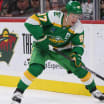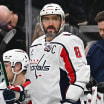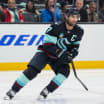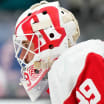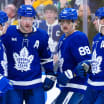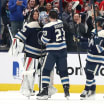TORONTO -- In a perfect world, Chris Murray, commissioner of the Toronto Gay Hockey Association (TGHA), knows his league would not have to exist. But the reality is, only in the past decade has the conversation started to move in a positive direction when it comes to acceptance for all players, regardless of sexual orientation.
Murray has played in three leagues for several years, which has given him an opportunity to experience the atmosphere around recreational hockey. While he feels intolerance and homophobic language have significantly reduced in the past 5 to 10 years, not that long ago there was a real need for a league like the TGHA.
Gay league thriving in Toronto
Association credits NHL's Hockey Is For Everyone month in helping with acceptance
By
Dave McCarthy
NHL.com Independent Correspondent
"There's a good deal of homophobia, trash talking, a little bit rougher than it has to get, so people looking for a kinder, gentler league where you don't have to put up with that [garbage] is what the TGHA is all about," Murray said.
As the NHL celebrates Hockey Is For Everyone month, events are being held throughout the League to promote this important initiative. On Saturday, the Toronto Maple Leafs hosted You Can Play Night during their game against the Buffalo Sabres at Air Canada Centre. Over 20 members of the TGHA were at the morning skate and participated in a meet-and-greet session with Maple Leafs alumnus Darryl Sitter. Murray said the impact of the NHL getting behind this initiative has had an immeasurable impact towards moving the conversation of acceptance and tolerance in a positive direction.
"I think it's that the NHL has taken a position of leadership where you can be who you are and just be a good hockey player," Murray said. "If you can play, you can play. I love that. What's even more impressive is sometimes it's not even a conversation anymore because a lot of people just don't care, which is really the way it should be."
The TGHA began in 1992 with a few like-minded guys getting together to play outdoor hockey on a regular basis. But over the years the league grew, slowly but surely, to the point where it is today: an 11-team organization in its 25th season which promotes equality and inclusiveness and provides an atmosphere where everybody feels comfortable to be who they are.
The goal of the league is to not only deliver a safe environment but also to promote awareness of the importance of inclusiveness throughout society. The good news is that Murray, who has been associated with the TGHA for nearly 20 years, feels people are coming to the league to be around like-minded people in a social setting and less as an escape from intolerance elsewhere.
"I've got to admit, that aspect of the league is slowly going away because people are more cognizant of homophobic language and it's not being tolerated as much as it used to be," Murray said.
He is often encouraged when speaking with players in their early-to-mid-twenties.
"A lot of the younger generation, people coming out of [a] university, are saying, 'You know I don't really have to join, I'm quite happy in the league I'm in right now. I'm accepted for who I am'," Murray said.
The league consists of approximately 165 players. It could be bigger, but like so many leagues and organizations in the Greater Toronto Area, it cannot get the ice time. Unfortunately, people have to be turned away because the league is at capacity.
Players are assessed based on skill level to ensure as much parity as possible. The league holds its draft in early September at a Toronto bar, which often has over 100 people in attendance. Captains select players from each skill level, ensuring new and balanced teams each year. The season begins in late September and concludes with a playoff tournament in the spring.
Anyone over the age of 18 is welcome, including heterosexual players, which Murray said often surprises people at first. But in a league designed around inclusion, it shouldn't.
"We have a number of heterosexual players and they come from varying areas," Murray said. "It used to be a best friend of somebody who was in the league or somebody's brother, but nowadays it just ends up being people that you know. The quality of hockey is good, the tournament teams that we send around are very, very good and it just ends up being more of a social league."
While play is competitive, the TGHA enforces strict code of conduct policies -- "You're not going to lose any teeth in our league," Murray said. And if that line is crossed, there is a zero-tolerance policy.
"If there is ever a punch thrown at you, you'll never see that person in the league again," Murray said. "We are very strict towards non-violence. Nobody throws a hit to hurt anybody. If they do, it's very tough disciplinary talk. It doesn't happen often but every so often it comes up."





